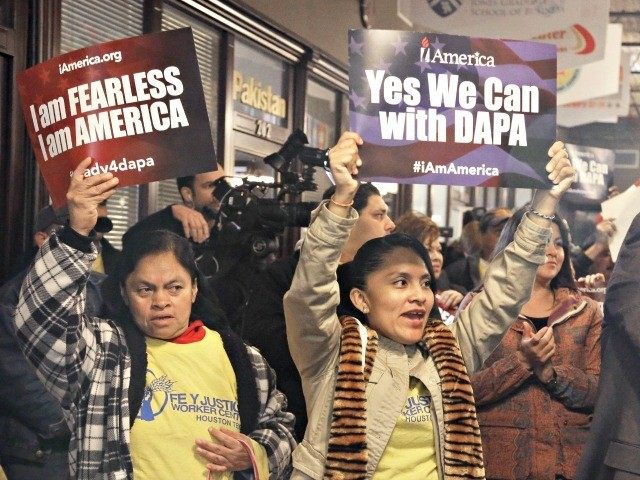Immigration activists say the new fees generated by the Deferred Action for Childhood Arrivals shows the program is working and is a reason to move forward with the expansion of executive amnesty.
Amnesty opponents note, however, that the fees pale in comparison with the expected cost to taxpayers and might not even fully cover the expense of the program itself.
“DACA is a model for what progress on immigration looks like — changed lives of people who came forward, followed the process and paid their fees — over $422 million so far,” Cristina Jimenez, managing director of United We Dream, told Buzzfeed Tuesday in reference to the estimated total of application fees generated by 908,500 illegal immigrants enrolled in the program.
Those application fees amount to $380 filing fee and $85 biometric services fee — a cost that is significantly less than the application fees required for immigrants to adjust status to a legal permanent resident — and are intended to fund the program itself.
According to Buzzfeed, Jimenez further touted the idea that President Obama’s Deferred Action for Parents of Americans and Lawful Permanent Residents (DAPA) and the expansion of DACA — currently blocked by the courts — could result in another $2.4 billion in first-time application fees, “not to mention renewals and the benefits to our economy of new businesses and jobs,” the publication quoted Jimenez.
With amnesty recipients eligible for Social Security, Medicare, and refundable tax credits, amnesty opponents point out that — should the courts allow the expansion of amnesty to move forward — the lifetime cost to taxpayers could be in the trillions.
“DAPA beneficiaries would immediately receive Social Security numbers and, in most cases, the eventual ability to obtain Social Security and Medicare benefits. The lifetime costs of Social Security and Medicare benefits to DAPA recipients are likely to be around $1.3 trillion (in constant 2010 dollars),” Heritage Foundation expert Robert Rector explained in written testimony for the House Oversight and Government Reform Committee earlier this year.
Further, as the Internal Revenue Service has confirmed, undocumented immigrants granted amnesty and Social Security Numbers will also be able to access the Earned Income Tax Credit (EITC) — including up to three years of back tax credits from the period in which they were working in the country illegally.
For DAPA beneficiaries, Rector estimated that taxpayers would be on the hook for $7.8 billion in EITC and ACTC annually.
Even with the cost of amnesty high, Center for Immigration Studies expert Jessica Vaughan points out that the application fee argument is “meaningless” anyway, as DACA application fees are already low and likely subsidized by the fees from legal immigrants.
“According to USCIS’ own calculations of the cost of adjudicating benefits, the fee for processing a benefit very similar to DACA was more than $1,000 — not counting the work permit or biometrics fee. Applicants in these other programs have to pay extra for work permits. These figures show that, because DACA applicants did not pay a fee that covered the total cost of processing their benefits, much of the true cost of the DACA program actually was borne by legal immigrants and their sponsors,” Vaughan explained to Breitbart News.
She noted that while the use of legal immigrant fees for DACA adjudications is “outrageous in itself,” legal immigrants have been experiencing delays as the Obama administration has been focusing on processing illegal immigrants’ applications.
“So the legal immigrants and their sponsors paid first class fees for what should have been priority treatment, but were treated like steerage class, while the illegal alien DACA applicants got the red carpet treatment,” Vaughan added, noting that one of the reasons the administration has tried to extend the DACA benefit from two to three years could be to help ease the cost burden.
But even outside the cost, amnesty opponents point out that regardless of the fees, the programs represent an overreach of executive power that is unfair to legal immigrants who play by the rules.
“The fact that DACA beneficiaries have paid in fees at least part of the cost of processing their applications — in fact, far less than legal immigrants who follow the law are required to pay — in no way makes up for the jobs and taxpayer-funded services they are taking from American workers,” Rosemary Jenks, NumbersUSA’s director of government relations, noted in an email.
“Paying a fee to take part in an unconstitutional amnesty does not make the amnesty any less objectionable or unconstitutional,” she added.

COMMENTS
Please let us know if you're having issues with commenting.